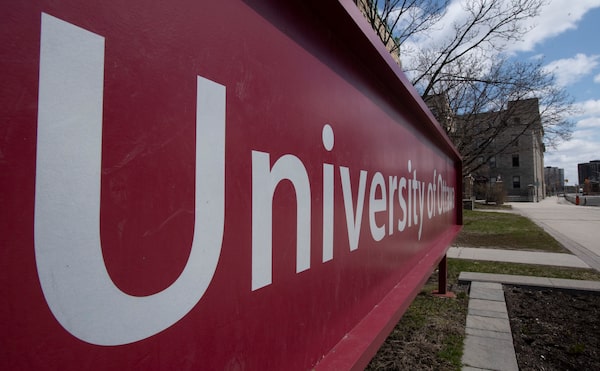
The University of Ottawa is seen on April 22, 2020. Ottawa's package includes $5.2-billion for a new Canada Student Emergency Benefit that will provide $1,250 a month for students who can’t find work.Adrian Wyld/The Canadian Press
Conservative Leader Andrew Scheer says his party is pushing for legislative changes to the federal government’s $9-billion support package for post-secondary students so that it includes incentives for them to accept available jobs.
Over the weekend, opposition parties received confidential copies of draft legislation to implement the package, which was announced last week. The bill could be introduced as early as Wednesday, when MPs are scheduled to sit in reduced numbers as part of a new arrangement that will see a mix of in-person and virtual meetings of the House of Commons over the next few weeks. A virtual sitting is scheduled for Tuesday.
The package included $5.2-billion for a new Canada Student Emergency Benefit that will provide $1,250 a month for students who can’t find work. It also included $1.9-billion for expanded student loans and $912-million for a Canada Student Service Grant that will provide up to $5,000 apiece to students who volunteer in their community on projects or programs related to COVID-19.
Mr. Scheer argues that incentives are vital. “Right now, there is no link between those available jobs. There is no incentive to fill them,” he said. “We believe that this program can be improved upon if there is that kind of link so that benefits can flow in a way that ensures that students are still getting experience and still learning a skill or getting hands-on training.”
Coronavirus guide: Updates and essential resources about the COVID-19 pandemic
Student advocates pushed back against Mr. Scheer’s comments, saying that summer jobs will be extremely scarce this year due to the COVID-19 pandemic. Canadian Federation of Students chairperson Sofia Descalzi said students will choose to work and gain experience if jobs are available.
“If students are able to find work, they will work,” she said. “The amount of job placements and work for students has reduced dramatically because of the crisis. This is by no means a program to be used as a handout for students. Because right now, students want to work. They want to get their work experience.”
Adam Brown, chair of the Canadian Alliance of Student Associations, expressed a similar view. “Our number one concern is that students need to make sure they have money for groceries and rent for the summer, and looking forward to tuition in the fall,” he said. “I think students are still really looking for work.”
Both student organizations are also calling on the government to expand the benefit to international students who were planning to stay and work in Canada over the summer.
The student benefit is aimed at recipients who don’t qualify for the two other income subsidy programs for individuals announced by Ottawa. One of those programs opened for applications Monday, and Prime Minister Justin Trudeau said there was already strong demand.
The Canada Emergency Wage Subsidy offers to cover 75 per cent of an employee’s wage, up to a maximum benefit of $847 a week. Mr. Trudeau said an online calculator launched last week to guide businesses in preparing wage-subsidy claims was viewed more than 300,000 times.
“And since the portal opened at 6 a.m. EDT this morning, almost 10,000 businesses have already applied for it,” he said at his daily morning news conference. “That gives you a sense of just how many people this program will help.” By 4:30 p.m., the Prime Minister’s Office said, the government had received about 30,000 applications.
The wage subsidy is similar to the Canada Emergency Response Benefit, but separate from it. The CERB provides $500 a week for up to 16 weeks to people who have lost their job or can’t work because of COVID-19.
Mr. Trudeau cautioned that some Canadians who may have already received CERB payments are now in line to receive retroactive wage-subsidy payments.
“It is one or the other,” he said. “So people should keep that in mind, that if you’re getting both, you should probably put one of them aside so that you can pay that back and you don’t get overly challenged with that down the road.”
The Prime Minister was also asked about the varying timelines being announced by provincial governments for reopening their economies. Mr. Trudeau repeated his view that restrictions should not be eased too quickly, but he did not criticize any of the provinces.
Instead, he praised the premiers for their co-operation in working on common guidelines for reopening, such as focusing on health-system capacity and testing levels, and drafting rules that are specific to each sector or industry.
“The provinces have the authority to determine what is in their best interests," he said. “It’s not up to the federal government to check or oversee the provinces in their areas of jurisdiction and much of this falls within their areas of jurisdiction."
Sign up for the Coronavirus Update newsletter to read the day’s essential coronavirus news, features and explainers written by Globe reporters and editors.